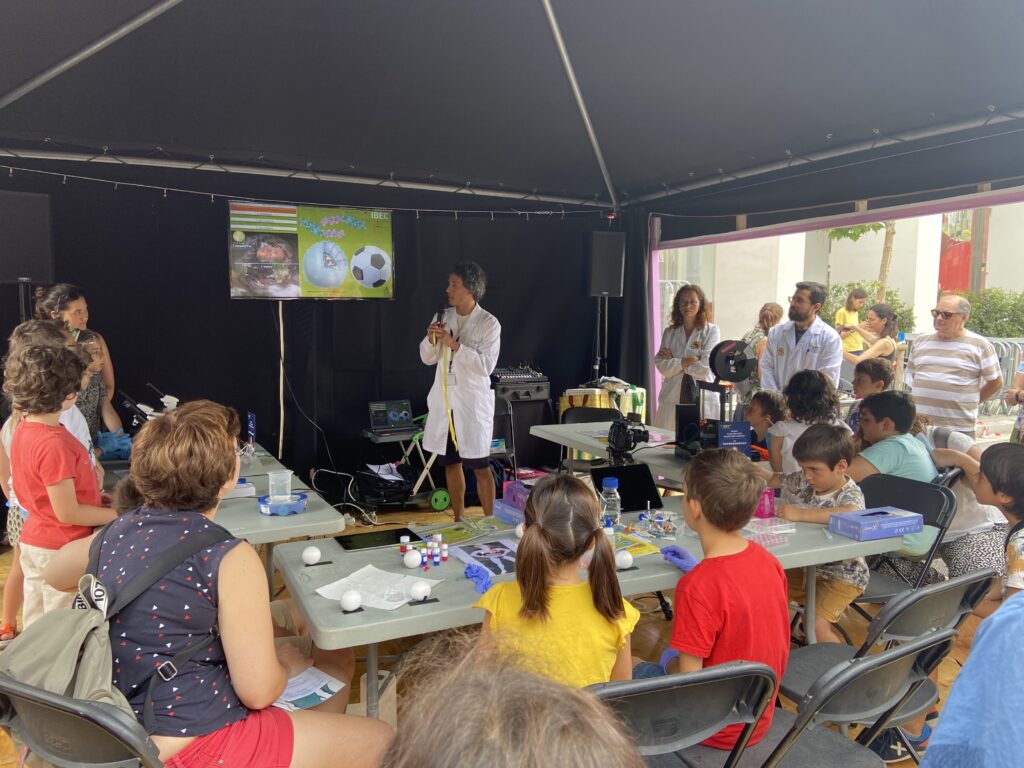The Institute of Bioengineering of Catalunya (IBEC) reaffirms its commitment to scientific education by renewing for the fifth consecutive time its accreditation as a Unit of Scientific Culture and Innovation (UCC+I). Over the past 10 years, the institute has brought bioengineering closer to society through initiatives that have impacted more than 40,000 people.

One of IBEC’s pillars is to foster interest in science, involve researchers in sharing their achievements, and contribute to improving the scientific culture of society by highlighting the importance of bioengineering in health-related topics. As part of this work, IBEC renewed its accreditation as a Unit of Scientific Culture and Innovation (UCC+I) at the end of 2024, granted every two years. This label, awarded by the Spanish Foundation for Science and Technology (FECYT) of the Ministry of Science, Innovation and Universities, recognizes the work of entities such as research centers and universities in transmitting science to society through various initiatives.
Thus, IBEC has had the privilege of belonging to the distinguished group of UCC+I for 10 years in recognition of its efforts in disseminating scientific results and promoting science outreach. At IBEC, the UCC+I is jointly driven by the Departments of Communication and Public Relations, and the Department of Strategic Initiatives.
UCC+I units, promoted by the Spanish Foundation for Science and Technology (FECYT) since 2007, act as a bridge between the institutions that host them and the public, promoting scientific outreach and education. Currently, the UCC+I network includes 117 registered entities in Spain, meeting excellence criteria in scientific communication and knowledge transfer activities.
Each year, the UCC+I of IBEC plays a key role in generating scientific news that has a significant impact on major media outlets. In 2024, there were 145 mentions in written press, radio, and television, and 865 online impacts in digital media, reaching a potential audience of more than 607 million people. Furthermore, IBEC’s presence on social media has solidified and continues to grow, with more than 30,000 followers across X, LinkedIn, Instagram, Bluesky, and YouTube.
“We want bioengineering not only to reach society but also to inspire scientific vocations and contribute to a more informed society, helping to create a better future. Scientific education is key to increasing the impact of research.”
– Pilar Jiménez, Head of the Communication and Public Relations Department at IBEC
With the aim of maximizing its impact on society, IBEC drives various scientific education projects, among which stand out the “Magnet,” “Bojos per la Bioenginyeria,” and “Escoles Rurals” projects.
The Magnet project, driven by the Bofill Foundation, the Department of Education of the Generalitat of Catalonia, the Consortium of Education of Barcelona, and the Institute of Educational Sciences of the UAB, which seeks to reduce school segregation, connects for four years educational centers experiencing segregation with a research institution of excellence to develop a joint, innovative, and high-quality educational project. IBEC has formed two alliances with schools so far, reaching 600 primary and secondary students.
The “Bojos per la Bioenginyeria” project from the Fundación Catalunya la Pedrera offers first-year high school students the opportunity to experience bioengineering for one year. Since its first participation in 2018, more than 190 students have passed through IBEC as part of this program.
Finally, for the past 4 years, IBEC has been promoting the “Escoles Rurals” program, bringing bioengineering to areas with limited access to scientific activities. To date, 1,479 children from rural areas have benefited from this project.
The organization of interactive workshops and mentoring programs connecting primary, secondary, and high school students with numerous scientists provides practical experiences that spark interest in bioengineering. Additionally, they present science as an attractive vocation for young people, inspiring them to consider careers in research and technology. Through collaborations with schools, it promotes activities that highlight the relevance of science in daily life, creating an environment where scientific curiosity is valued and nurtured, enriching the education of new generations.
On the other hand, IBEC’s participation in fairs, outreach events, and projects that connect art and science fosters the culture of science and innovation while strengthening the link between research and the community. The interest generated by IBEC in these events is reflected by the IBEC Superfriends Club, which currently has over 1,600 members.
Another pioneering program driven by IBEC is IMAB, which targets people over 65 years old. So far, 19 workshops have been carried out within the project, bringing bioengineering to around 300 people.
Finally, we would like to highlight IBEC’s commitment to diversity and inclusion. With our Inclusive Science project, we have created materials for the entire educational community to focus scientific education activities on addressing the special needs that may arise in each classroom.
“The accreditation of IBEC as a UCC+I for 10 years reflects our commitment to promoting science as a driver of development and social well-being, through innovative educational and outreach projects and strategies that bring citizens closer to bioengineering and biomedical research. We are very proud to have reached over 40,000 people with our activities.”
– Teresa Sanchis, Head of the Department of Strategic Initiatives at IBEC.





